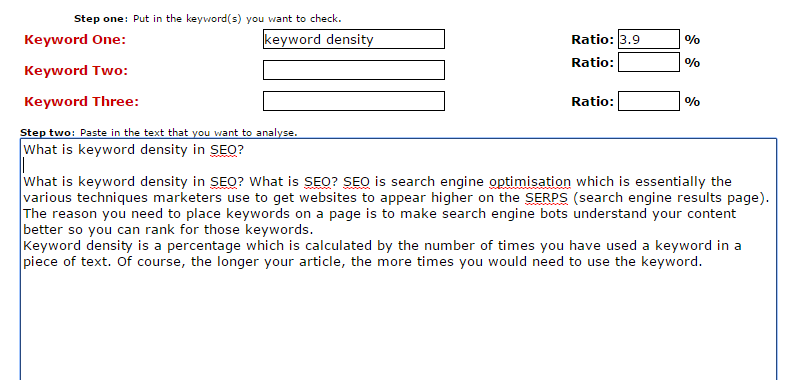
It’s 2017… Does Keyword Density Still Matter?
I have heard this question three times in the last week so if you are thinking it’s 2017… do keywords still matter then you’re not alone. In this article, I’m going to answer the question does keyword density still matter and look at how you can use keywords to optimise your blog or website.
What is keyword density in SEO?
What is keyword density in SEO? What is SEO? SEO is search engine optimisation which is essentially the various techniques marketers use to get websites to appear higher on the SERPS (search engine results page). For example, if you are a law firm who needs to market their brand and services online, you would need to learn more about how SEO works – and the best way to go about it would be to contact an agency who can give you the right knowledge and also, help you in ranking higher.
Now, let’s get to why you need to know more about keyword density and how it helps you. The reason you need to place keywords on a page is to make search engine bots understand your content better so you can rank for those keywords.
Keyword density is a percentage that is calculated by the number of times you have used a keyword in a piece of text. A reputed SEO agency might make use of this feature to highlight and promote content on various platforms. Of course, the longer your article, the more times you would need to use the keyword.
Keyword Density Example
In an article of 100 words I use my keyword 10 times then the density is 10%.
In an article of 500 words I use my keyword 10 times then the density is 2%
Don’t worry, you don’t need to be a mathematician to work it out, I’m certainly not and there are tools to help you. By the way, 10% is too high and we will come to that.
Do Keywords Still Matter?
In recent days, the density of keywords matters much less than the overall site quality and site authority. The main authority on what matters and what doesn’t is Google which occasionally rolls out a “major” algorithmic update (such as Google Panda, Google Penguin, and Google Hummingbird. The Google update for Hummingbird dictated that:
- Original and engaging content is still king
- Legitimate backlinks that are earned using proper SEO are still important
- The same signals that worked before will continue to garner results
- Keywords will still need to be carefully placed and used in moderation
Carefully placed and used in moderation means that you are not packing your sentences with keywords just for the sake of it. For example, if my keywords are forex trading:
Good Sentence
If you are interested in forex trading, then you may want to check out our online academy for useful hints and tips
Bad Sentence
If you are interested in forex trading, then check out our forex trading academy where you can learn about forex trading.
“Keyword stuffing” is old news, and nowadays it can actually damage your content ranking.
So How Do I Use Keywords
So, you know what you shouldn’t be doing but how do you actually use keyword density in your writing?
- First find the most used keywords (plural) for your topic. There are many different ways to find your keywords but one easy way is to see which keywords your competitors are using. Use the Screaming Frog Spider software to perform a simple SEO crawl on your competitor’s site. You could also use the Google Keyword planner tool and enter your competitors url.
- Rank your keywords in order of importance. This directly correlates to the number of searches potential customers will perform on those words. Remember that depending on your topic, each page on your website may have a different set of keywords. Note them down so you can easily brief your writer or web developer. If you are using a tool like AddMe then you can generate a report automatically.
- Lastly, write your text naturally and don’t exceed 2-3% keyword density. This way you avoid keyword stuffing problems. My favourite tool for this is http://www.live-keyword-analysis.com/. Simply write your text in Word as you would normally, copy and paste it over to the live analysis tool and enter your keywords. Remember 2-3% is great. If you see that your keywords are a bit below that then don’t worry. If, however, you see they are at 8% you may want to remove a few from your text. It will not endear you to Google.

So where should I place my keywords?
Actually, placement of keywords does matter because the search engine bots are checking your site to ensure the headers, images and text all match your keyword. Here are some of the best places to slot in keywords.
- In the permalink
- H1 tag
- H2 tag
- Meta title tag
- First paragraph
- Last paragraph
Any other tools?
As a writer, I use a ton of tools to help me with keyword density, SEO and ranking. Some like the one from SEO Centro will analyse from a url which is great for live pages. Others like Yoast are plugins for WordPress and will automatically calculate prior to publishing. If you are writing for a client’s website, then you will need to use an offline density calculator such as the live keyword density analysis.

Do you watch your keyword density percentages? Tweet me @Charli_Says


